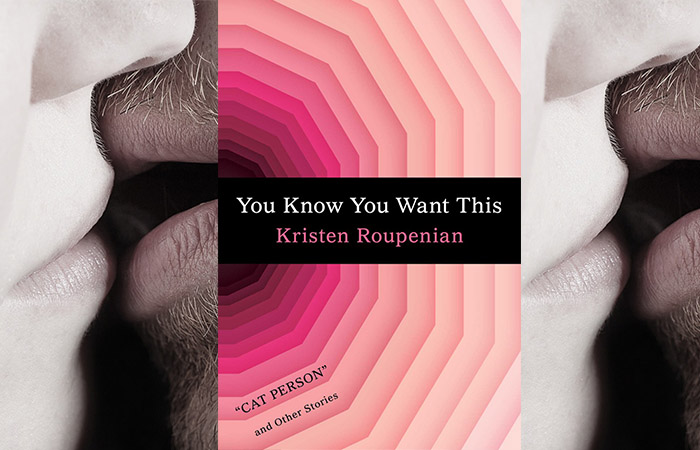Review: “You Know You Want This: Cat Person and Other Stories”

The horror section of the bookstore is not a place every reader wishes to venture into. Some people have no taste for danger, dread, and gore in their fiction. Then there are readers like me, readers who are drawn to the darker side of life. When we see a car accident, we slow down and gawk at the scene. When Netflix releases a Ted Bundy documentary series, we get comfy and binge all 235 minutes of it. And when we see a short story collection entitled You Know You Want This with a hypnotizing, black hole-esque cover? Yeah, we want this. Writers who understand these cravings, like Kristen Roupenian—author of the aforementioned collection—deliver exactly what we want, simultaneously evoking feelings of satisfaction and disorientation.
Roupenian’s name might be familiar because one of the stories in this collection, “Cat Person,” went viral when it was first published in The New Yorker in 2017. The story revolves around a young woman who develops a flirtatious relationship with an older man. Later, as they’re about to have sex, she realizes she’s not as interested in him as she thought she was. But she gets so caught up in the moment, in her anxieties, that she goes ahead and does something she does not wish to do. The aftermath of this experience, particularly the way both characters react, sparked a relevant debate across social media in the wake of the #MeToo movement.
Some readers questioned if “Cat Person” was a personal essay rather than fiction, and in response Roupenian would later write in a “Page-Turner” piece for The New Yorker: “The story was not autobiographical, but it was, nonetheless, personal—everything I write is personal—and here were all these strangers dissecting it, dismissing it, judging it, fighting about it, joking about it, and moving on.” Regardless of Roupenian’s discomfort with the cultural conversation it seemed to start, “Cat Person” resulted in a seven-figure book deal, and You Know You Want This is the first of two books in that deal. The collection created plenty of buzz in the literary community, and HBO bought the rights for a possible drama series. With that in mind, Roupenian has high expectations to fulfill; after all, the publication of “Cat Person” single-handedly turned this unknown writer into a household name. However, avid fans of the story might be disappointed to get new content that is different from what they fell in love with.
You Know You Want This isn’t just a series of “Cat Person” 2.0 and 3.0 and so on. For me, the disappointment of that disappeared the deeper I got into this odd collection of horror stories. Roupenian uses eccentric characters and situations to explore different manifestations of reality. The eccentricity can come across as alien, making it hard to grasp at times, but Roupenian pulls it off with a relatable, modern voice that slips easily off the page. The resulting prose is genuinely fun, and every now and then, she’ll generate surprise with a sentence of perfect unease. That uneasiness builds and builds until I was itching to get to that ending.
The further I got into the rest of the collection, the more Roupenian sucked me into this enticing black hole she’s created, writing with confidence and nonchalance. She never risked over-explanation and instead let the horror speak for itself. The reader runs the gamut of horror, from the terrible consequences of a birthday wish in the story “Sardines” to a questionable skin condition causing mental anguish in “The Matchbox Sign.” My favorite was one of the more fantastical stories, “The Mirror, the Bucket, and the Old Thigh Bone,” a story just as strange as its title. Here, a beautiful princess goes through an entire kingdom of suitors before settling on a mysterious figure that appears late at night. Once that mysterious figure is brought to light, something breaks in the princess that no one can ever repair.
The opening story, “Bad Boy,” is an example of Roupenian’s gift for intensity built through uneasiness. Told with a rotating point of view, the story introduces us to a couple letting a friend crash at their place. They gradually involve the friend in their sexual relationship, having realized that he is now their only source of pleasure, and the three form a dangerous, obsessive relationship. “He was like some slippery thing we had caught in our fists,” the couple muse, “and the harder we squeezed the more it bubbled through our fingers. We were chasing something inside of him that revolted us, but we were driven mad as dogs by the scent.” The couple impulsively continue this chase, even as they drift apart from the friend, until they finally get what they want. What the couple wants doesn’t seem like something anyone would want, but Roupenian’s willingness to charge through to an uncomfortable ending is what allows her writing to seep under the skin.
After all the bad boys, cat people, and the deranged princesses, the collection ends with “Biter,” which features, as might be inferred, a whole lot of biting. The protagonist, Ellie, knows that biting people is wrong. It’s an addiction that she has to fight every day of her life: “She invented a game, a game called Opportunity. Ellie wasn’t going to bite Corey, even though she wanted to, and she thought she deserved some credit for that. So whenever she found herself in a situation where she could have bitten him, and didn’t, she awarded herself a point… One point for passing him in an empty stairwell. One point for noticing when he went into a single-occupancy bathroom and didn’t immediately lock the door.” Ellie’s game becomes the focus of the second half of the story, as does her weakening self-control. However, considering all of the content before it, Ellie’s story isn’t the most exciting to end You Know You Want This with.
As with most collections, some stories are more memorable than others. And as with most great collections, the overall product is what lingers in the mind. Roupenian can make the reader incredibly uncomfortable and disgusted and riveted all at once, her prose settling like the memory of a bad dream. While “Cat Person” is, and might always be, Roupenian’s most well known piece, she’s definitely proven with this collection that she is no one-hit wonder. Each piece reflects on modern day relationships, whether they’re with ourselves, our friends, or our significant others. And though her stories may bring up thoughts we’d rather avoid, Roupenian reminds us that it’s okay to embrace what scares us.


